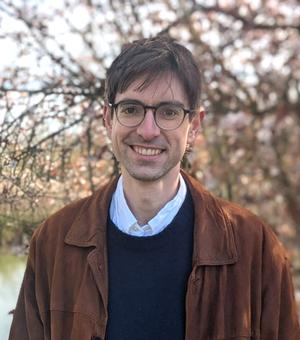Professor Ted Tregear
My research ranges across the poetry and drama of early modern England, with a tendency to return to Shakespeare. I am especially interested in the relationship — notoriously difficult — between poetry and philosophy, and in the kinds of philosophical thinking that poetry of this period can do. Before coming to Oxford, I spent two years as a Lecturer at St Andrews, and three years as a Research Fellow in Cambridge, where I also did my PhD.
My first book, Anthologizing Shakespeare, 1593-1603, was published by Oxford University Press in 2023. Based on my doctoral thesis, this took its cue from five anthologies, all printed between 1599 and 1601, which featured excerpts from Shakespeare alongside other contemporary writers. Guided by the passages they chose, I presented a new account of Shakespeare’s first decade in print, from Venus and Adonis (published in 1593) to Hamlet (published in 1603). At its heart, this was an experiment in using book history and the history of reading to help read Shakespeare more closely, with an eye to the moments that looked especially extractable to his early readers.
I have also published more broadly on Shakespeare’s poems and plays, and continue to spend lots of my time thinking about him. At the moment, I am writing an introduction to the New Oxford edition of his final tragedy Coriolanus. I am also still hung up on his most mysterious poem, often known as ‘The Phoenix and Turtle’, and on the mysterious anthology in which it first appeared. My colleague Dr Sean Geddes (Oxford) and I are currently editing an essay collection on that anthology, the 1601 Love’s Martyr, in the hope of better understanding what it’s all about.
Since my first book came out, I have been at work on a second project, tentatively entitled What Is Metaphysical Poetry? This takes off from the style of seventeenth-century poetry often known as ‘metaphysical’ — a name that’s been around almost as long as the thing itself — and asks what, if anything, is metaphysical about it. Drawing on philosophy, theology, intellectual history, and critical theory, it explores the surprising affinities between poetry and metaphysics through readings of a variety of early modern poets, from Shakespeare and Donne to Cowley and Cavendish. This work has prompted recent essays in English Literary History and the Review of English Studies, and will eventually result in my second monograph. It also forms the basis of several ongoing collaborations, including the British Academy-funded project I run with Dr Namratha Rao (York), Materialism and Metaphysics in Early Modernity.
Alongside these projects, I am also thinking about rhyme and history in Samuel Daniel, obvious acrostics in George Herbert, and the global extent of the early modern Baroque. I am one of the people editing Richard Barnfield’s poetry for the Longman Annotated English Poets series. Beyond the early modern, I have broader (and more inexpert) interests in: poetics and literary criticism; Marxist social, economic, and aesthetic theory; psychoanalysis; classical music; and the German philosophical tradition, from Immanuel Kant to Theodor Adorno.
For the English FHS course, I teach Papers 1 (Shakespeare); 3 (1550-1660); 4 (1660-1760); and 5 (1760-1830). I also co-teach a Paper 6 option with Prof Joe Moshenska, ‘Experiments in the First Person’. For the Faculty, I lecture on early modern lyric (from Ann Lock to Abraham Cowley) and on Shakespeare, race, and empire. I would be happy to hear from potential graduate students interested in writing about any of my research interests.
My research has been supported by the Wolfson Foundation, the Society for Renaissance Studies, and the British Academy. I am the English subject editor for the interdisciplinary journal Forum for Modern Language Studies, and would encourage anyone thinking of submitting to get in touch.




